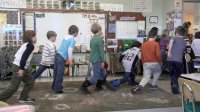Getting Students Ready for Learning
Responsive Classroom techniques, such as relationship-building morning meetings and engaging student-led activities, get students focused and ready to learn.
Your content has been saved!
Go to My Saved Content.Overview
Building Positive Relationships
At Mount Desert Elementary School, all K-3 classrooms use the Responsive Classroom approach, and many Mount Desert upper-grade teachers also employ this technique. Key elements include:
- Every morning, the entire class comes together as a community to greet one another, share news, and warm up for the day ahead.
- Teachers use positive words and tone to promote active learning, a sense of community, and self-discipline to achieve goals.
- Teachers also carefully model expected behaviors.
- To make learning active and engaging for students, and to promote autonomy, teachers provide students with structured choices in their activities.
The Responsive Classroom approach is established at the beginning of the school year, when teachers and students work together to co-construct expectations for a positive learning environment and create rules that connect expectations to their learning goals.
How It's Done
Responsive Classroom Techniques
At the beginning of each school year, teachers and students collaborate on a list of the expected behaviors for that year along with rules that connect their expectations to their learning goals. The following tools support the Responsive Classroom model:
Effective Transitions
Students help decide how to transition from one learning activity to another without losing focus, for example, by using tools such as “hook ups” stretching exercises designed to increase blood flow to the brain (see Brain Gym at http://esl.about.com/od/englishlessonplans/a/braingym.htm), yoga stretch walks, sun dances, step counting, or crab walks. This not only helps students to regulate their energy levels but also cuts down on time the teacher has to spend at the beginning of class to refocus the students. The transitions are not considered addendums but part of the actual learning activities that help students produce higher-quality academic work.
Morning Meetings
In their regular morning meetings, students are encouraged to share personal feelings and their profoundest thoughts with their classmates and teacher to build a culture of respect and to help them regulate their emotions and diminish their impulsivity. Every morning, the members of the class take time to sit in a circle and greet one another, share news, and check in with each student. Then the students perform a warm-up for the day.
Positive-Behavior Models
During the year, the teachers model positive language and tone to promote active learning and self-discipline. Teachers also carefully model the previously agreed upon expected behaviors to help the students practice regulating their own behaviors.
Logical Consequences
The use of logical consequences for behavior further helps to create a Responsive Classroom environment. When a student misbehaves, the teacher makes it clear to that student that it is the misbehavior that is the problem and not the student. As a consequence for misbehavior, the teacher helps the student find ways to fix or resolve the problem rather than simply scolding or handing out punishment.
Mount Desert Elementary
Enrollment
170 | Public, RuralPer Pupil Expenditures
$15756 School • $15756 District • $9121 StateFree / Reduced Lunch
20%DEMOGRAPHICS:
1% English language learners
15% Special services
